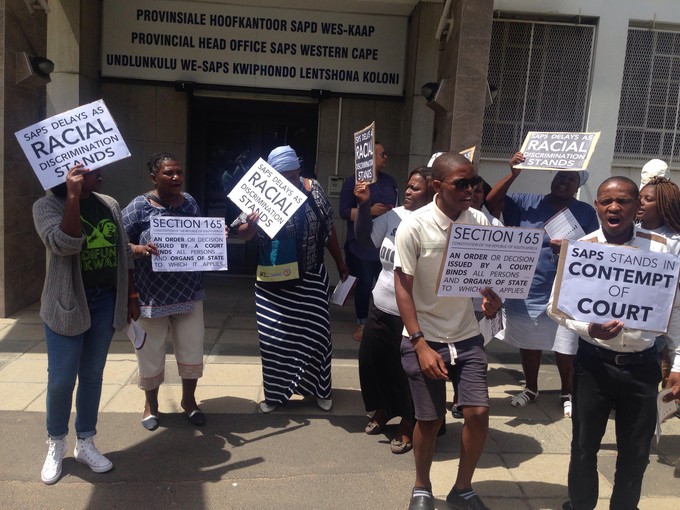SJC accuses police of contempt of court
Picket in Cape Town over allocation of police resources
The Social Justice Coalition (SJC) has accused the South African Police Service (SAPS) of contempt of court for failing to file papers in a court case involving allocation of staff to police stations.
SJC members held a picket outside the SAPS provincial head office in Cape Town today.
The organisation says the SAPS has failed to file responding papers in the case launched by the SJC, Equal Education, and the Nyanga Community Police Forum (CPF) under the Promotion of Equality and Prevention of Unfair Discrimination Act. SAPS was due to file papers by 30 November 2016 in terms of a court order on 5 September.
The case was launched to address allocations of police staff to the 1,140 police stations.
The head of the SJC’s safety and justice programme, Chumile Sali, said SAPS was delaying the court process and the re-allocation of police resources.
“The Minister has not responded, the acting police commissioner and provincial commissioner have not responded. This is long overdue.”
The Khayelitsha Commission of Inquiry recommended that more detectives should be deployed to Khayelitsha police stations and that the current police resource allocation system should be revised.
According to a statement published by the SJC, Harare in Khayelitsha has a three times higher rate of murders than Cape Town Central, but 1/14th the number of police.
Nyanga CPF chairperson Martin Makasi, who has been living in Nyanga for 39 years, said the attitude of the SAPS showed that SAPS did not care.
“The ‘People First’ slogan that the government is using clearly doesn’t mean anything to them.”
He said extra staff had been allocated to Nyanga but it was not enough.
“They are disrespecting the court and are not setting an example,” said Makasi.
Support independent journalism
Donate using Payfast

Don't miss out on the latest news
We respect your privacy, and promise we won't spam you.
Next: The Joburg township where outlaws make the rules
Previous: Retrenched AngloGold miner battles to repay labour broker
© 2017 GroundUp. 
This article is licensed under a Creative Commons Attribution-NoDerivatives 4.0 International License.
You may republish this article, so long as you credit the authors and GroundUp, and do not change the text. Please include a link back to the original article.

